Related Research Articles

Frederick George Peter Ingle Finch was an English-Australian actor of theatre, film and radio.
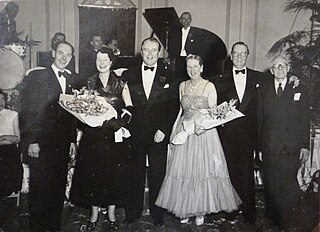
Jack Warner, OBE MSM was a British actor. He is closely associated with the role of PC George Dixon, which he played in the 1950 film The Blue Lamp and later in the television series Dixon of Dock Green from 1955 until 1976, but he was also for some years one of Britain's most popular film stars.

Jedda, released in the UK as Jedda the Uncivilised, is a 1955 Australian film written, produced and directed by Charles Chauvel. His last film, it is notable for being the first to star two Aboriginal actors, Robert Tudawali and Ngarla Kunoth in the leading roles. It was also the first Australian feature film to be shot in colour.

Jack Thompson, AM is an Australian award-winning actor, who is a major figure of Australian cinema, particularly Australian New Wave.
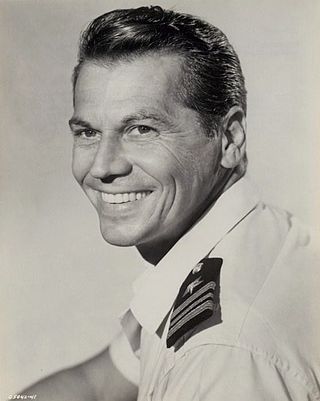
Ronald Egan Randell was an Australian actor. After beginning his acting career on the stage in 1937, he played Charles Kingsford Smith in the film Smithy (1946). He also had roles in Bulldog Drummond at Bay (1947), Kiss Me Kate (1953), I Am a Camera (1955), Most Dangerous Man Alive (1961) and King of Kings (1961).
Ronald Grant Taylor was an English-Australian actor best known as the abrasive General Henderson in the Gerry Anderson science fiction series UFO and for his lead role in Forty Thousand Horsemen (1940).
Blue Hills, created and written by Gwen Meredith, is an Australian radio serial about the lives of families, set in a fictional typical Australian country town called Tanimbla. The title "Blue Hills" itself derives from the residence of Dr. Gordon, the town's doctor.
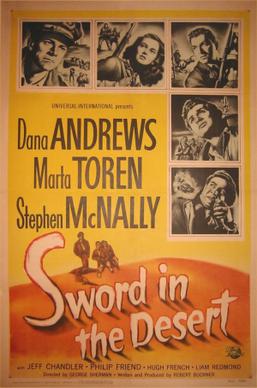
Sword in the Desert is a 1949 American war film directed by George Sherman. It was the first American film to deal with the 1947–1948 Civil War in Mandatory Palestine and marked the first significant feature film role for Jeff Chandler.
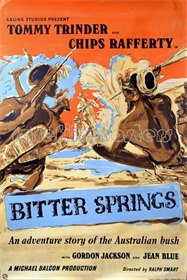
Bitter Springs is a 1950 Australian–British film directed by Ralph Smart. An Australian pioneer family leases a piece of land from the government in the Australian outback in 1900 and hires two inexperienced British men as drovers. Problems with local Aboriginal people arise over the possession of a waterhole. Much of the film was shot on location in the Flinders Ranges in South Australia
Sons of Matthew is a 1949 Australian film directed and produced and co-written by Charles Chauvel. The film was shot in 1947 on location in Queensland, Australia, and the studio sequences in Sydney. Sons of Matthew took 18 months to complete, but it was a great success with Australian audiences when it finally opened in December 1949.
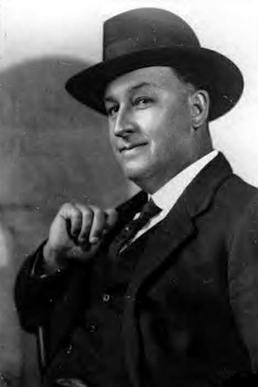
Raymond Longford was a prolific Australian film director, writer, producer, and actor during the silent era. Longford was a major director of the silent film era of the Australian cinema. He formed a production team with Lottie Lyell. His contributions to Australian cinema with his ongoing collaborations with Lyell, including The Sentimental Bloke (1919) and The Blue Mountains Mystery (1921), prompted the Australian Film Institute's AFI Raymond Longford Award, inaugurated in 1968, to be named in his honour.
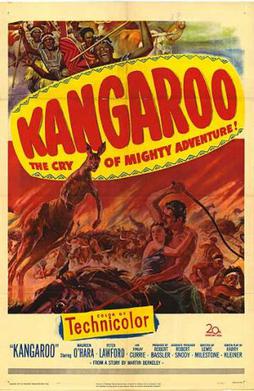
Kangaroo is a 1952 American Western film directed by Lewis Milestone. It was the first Technicolor film filmed on location in Australia. Milestone called it "an underrated picture."
The Squatter's Daughter is a 1933 Australian melodrama directed by Ken G. Hall and starring Jocelyn Howarth. One of the most popular Australian films of the 1930s, it is based on a 1907 play by Bert Bailey and Edmund Duggan which had been previously adapted to the screen in 1910.

Bush Christmas is a 1947 Australian–British comedy film directed by Ralph Smart and starring Chips Rafferty. It was one of the first films from Children's Entertainment Films, later the Children's Film Foundation.

The Kangaroo Kid is a 1950 Australian-American Western film directed by Lesley Selander.
Agnes Gavin (1872–1947), was an Australian actor and screenwriter in the silent film era. She worked in collaboration with her husband John Gavin throughout her career. She wrote the majority of his films and was arguably the first specialist screenwriter in the history of the Australian film industry. In newspapers she was advertised as the "well known picture dramatizer" and was praised for creating "cleverly constructed stories". Many of her films are considered lost.
The Fatal Wedding is a play by Theodore Kremer and a 1911 Australian silent film directed by Raymond Longford based on the melodrama, which he and Lottie Lyell had toured around Australia.

Alfred Rolfe, real name Alfred Roker, was an Australian stage and film director and actor, best known for being the son-in-law of the celebrated actor-manager Alfred Dampier, with whom he appeared frequently on stage, and for his prolific output as a director during Australia's silent era, including Captain Midnight, the Bush King (1911), Captain Starlight, or Gentleman of the Road (1911) and The Hero of the Dardanelles (1915). Only one of his films as director survives today.
It Is Never Too Late to Mend is an Australian feature-length silent film written and directed by W. J. Lincoln. It was based on a stage adaptation of the popular 1865 novel It Is Never Too Late to Mend: A Matter-of-Fact Romance by Charles Reade about the corrupt penal system in Australia. It was called "certainly one of the best pictures ever taken in Australia."
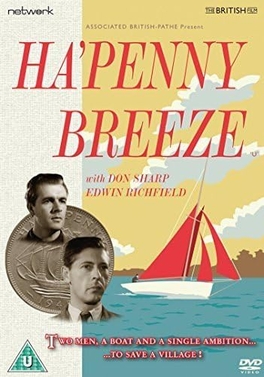
Ha'penny Breeze is a 1950 black and white British film directed by Frank Worth and starring Edwin Richfield, Don Sharp and Gwynneth Vaughan. It was the first writing credit for Don Sharp who also appears as an actor.
References
- ↑ "New Australian Actors In Local Migrant Film". The Sydney Morning Herald . National Library of Australia. 7 December 1950. p. 19. Retrieved 27 October 2014.
- ↑ "...REVIEWS OF NEW FILMS IN SYDNEY..." The Sunday Herald . Sydney: National Library of Australia. 10 December 1950. p. 5 Supplement: Sunday Herald Features. Retrieved 27 October 2014.